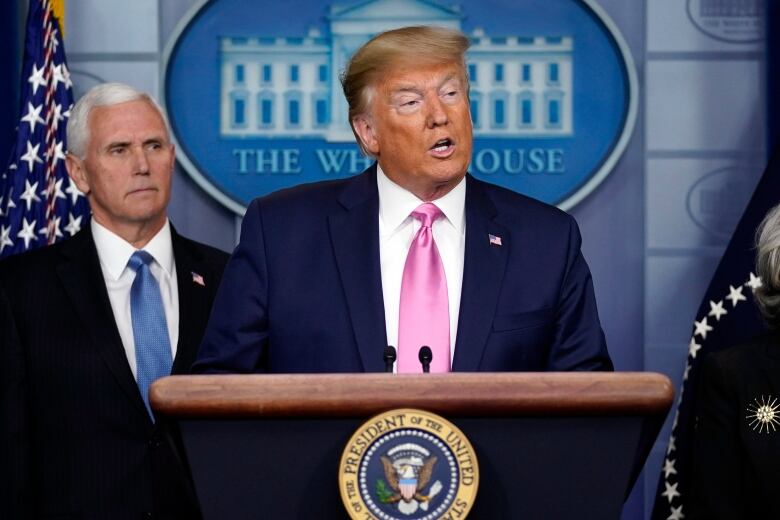
This article is more than
5 year old
The delayed response by the U.S. government to the coronavirus outbreak could have significant ramifications, including the number of people ultimately diagnosed as infected and potential fatalities from the disease, some health policy experts say.
On Monday, U.S. authorities confirmed more than 100 cases across the country, while in Seattle, officials announced four more deaths, bringing the total in the U.S. to six. However both numbers are expected to rise dramatically and U.S. President Donald Trump has blamed political rivals for "fear mongering" about the spread of the virus.
"There is a feeling among the public health community, that this administration should have been doing much more, much faster, and there's still probably much more that could and should be done," said Rebecca Katz, director of the Center for Global Health Science and Security at Georgetown University.
"Unfortunately, we might measure the ramifications in morbidity and mortality."
Singapore, for example, has been taking aggressive measures on contact tracing — identifying individuals who may have come into contact with an infected person — for every potential case in order to isolate or quarantine, Katz said.
"And those measures have a direct impact on how much the disease is spreading within their community. So the implications are if we're not doing that, if we're not taking those actions, then the disease spreads."
While U.S. state and local authorities carry much of the responsibility for public health issues, the federal government can provide resources to those jurisdictions.
"There is a feeling of frustration ... that the federal government could be way more in front of making sure that our frontline health care workers have the resources that they need ... that we are moving money, that there are hotlines set up, that we are communicating more regularly," Katz said.

For the most part, there have been "wonderful experts" working hard to address this crisis, said Josh Michaud, associate director of global health policy at the Kaiser Family Foundation, a California-based non-profit group.
"There have been some clear areas where the U.S. response has faltered," he said.
The Trump administration has come under fire for what some claim has been a slow response to the crisis. In particular, critics have zeroed in on delays in testing people suspected of being infected.
The Centers for Disease Control and Prevention (CDC) recently broadened its guidelines for who should be tested to include people with symptoms but without a travel history to virus hot zones.
Katz said other countries have already been testing tens of thousands more people than the U.S.
"So the fact that we're just really ramping up our testing this week feels a bit delayed and feels like we're probably missing a whole bunch of cases in the United States," she said.

For an almost inexplicably long time, Michaud said, there were tight restrictions on who was recommended to be tested, how many tests were available, which locations could run the tests and on the number of tests that could run in a day.
That was, in part, due to how the tests were developed by the CDC and one of the ingredients not working as expected, he said.
"But to address that, it seemed to take longer than it probably should," Michaud said. "And the development of this kind of test ... it's not, shall we say, rocket science.
"So it speaks to the fact that there has been some management and administrative barriers along the way to getting this test developed, approved and out the door to the places that need to test."
What that means, Michaud suggested, is that the U.S. is somewhat in the dark about the distribution of this disease, how many cases, where these cases have come from and where there are active transmission chains.
"That is the recipe for flying blind," he said. "So the expectation is that when we do expand testing, all of a sudden there's going to be a mushrooming of cases that have been there."
Critics have raised additional problems, along with delays in testing. A government whistleblower has filed a complaint alleging that some federal workers did not have the necessary protective gear or training when they were deployed to help Americans evacuated from China during the coronavirus outbreak.
"Do we end up with frontline health care workers who are infected because we didn't get personal protective equipment out for them or effective training out to them on time," Katz said.
"I really don't think we're anywhere close to where we need to be right now."

The naming of U.S. Vice-President Mike Pence to oversee and coordinate the response of government agencies has also drawn criticism and renewed scrutiny of his handling of an HIV outbreak in southern Indiana in 2015 when he was governor.
Some have suggested the HIV outbreak could have been prevented if Pence, who reluctantly agreed to authorize a needle exchange program, had acted earlier.
While Pence is not a technical expert in disease control or viruses, relying on people who are experts to guide decision making would be a sign of effective leadership, Michaud said. Pence did receive praise for naming Debbie Birx, a State Department ambassador-at-large and medical doctor, to be the coronavirus response coordinator.
In contrast to some other experts, William Schaffner, a professor of preventative medicine and infectious diseases at the Vanderbilt University School of Medicine, offered a positive outlook on the U.S. government's response to the crisis. For identifying cases, putting people in quarantine and taking care of patients, he gives the government an excellent grade.
"The containment policy has been seemingly very successful. You had relatively few numbers of cases, they've been quickly identified, put in isolation, are getting good treatment and are getting better," Schaffner said.
"We had some slippage there because we couldn't get the testing out. And so that gets a B-minus. But we're working hard to get back to A to get that testing now more widely available."